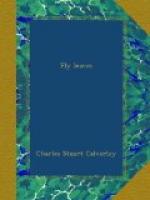A minstrel’s fire within me burn’d,
I’d sing, as one whose heart
must break,
Lay upon lay: I nearly learn’d
To shake.
All day I sang; of love, of fame,
Of fights our fathers fought of
yore,
Until the thing almost became
A bore.
I cannot sing the old songs now!
It is not that I deem them low;
’Tis that I can’t remember how
They go.
I could not range the hills till high
Above me stood the summer moon:
And as to dancing, I could fly
As soon.
The sports, to which with boyish glee
I sprang erewhile, attract no more;
Although I am but sixty-three
Or four.
Nay, worse than that, I’ve seem’d of late
To shrink from happy boyhood—boys
Have grown so noisy, and I hate
A noise.
They fright me, when the beech is green,
By swarming up its stem for eggs:
They drive their horrid hoops between
My legs:-
It’s idle to repine, I know;
I’ll tell you what I’ll
do instead:
I’ll drink my arrowroot, and go
To bed.
FIRST LOVE.
O my earliest love, who, ere I number’d
Ten sweet summers, made my bosom
thrill!
Will a swallow—or a swift, or some bird
—
Fly to her and say, I love her still?
Say my life’s a desert drear and arid,
To its one green spot I aye recur:
Never, never—although three times married
—
Have I cared a jot for aught but
her.
No, mine own! though early forced to leave you,
Still my heart was there where first
we met;
In those “Lodgings with an ample sea-view,”
Which were, forty years ago, “To
Let.”
There I saw her first, our landlord’s oldest
Little daughter. On a thing
so fair
Thou, O Sun,—who (so they say) beholdest
Everything,—hast gazed,
I tell thee, ne’er.
There she sat—so near me, yet remoter
Than a star—a blue-eyed
bashful imp:
On her lap she held a happy bloater,
’Twixt her lips a yet more
happy shrimp.
And I loved her, and our troth we plighted
On the morrow by the shingly shore:
In a fortnight to be disunited
By a bitter fate for evermore.
O my own, my beautiful, my blue eyed!
To be young once more, and bite
my thumb
At the world and all its cares with you, I’d
Give no inconsiderable sum.
Hand in hand we tramp’d the golden seaweed,
Soon as o’er the gray cliff
peep’d the dawn:
Side by side, when came the hour for tea, we’d
Crunch the mottled shrimp and hairy
prawn:-
Has she wedded some gigantic shrimper,
That sweet mite with whom I loved
to play?
Is she girt with babes that whine and whimper,
That bright being who was always
gay?
Yes—she has at least a dozen wee things!
Yes—I see her darning
corduroys,
Scouring floors, and setting out the tea-things,
For a howling herd of hungry boys,




